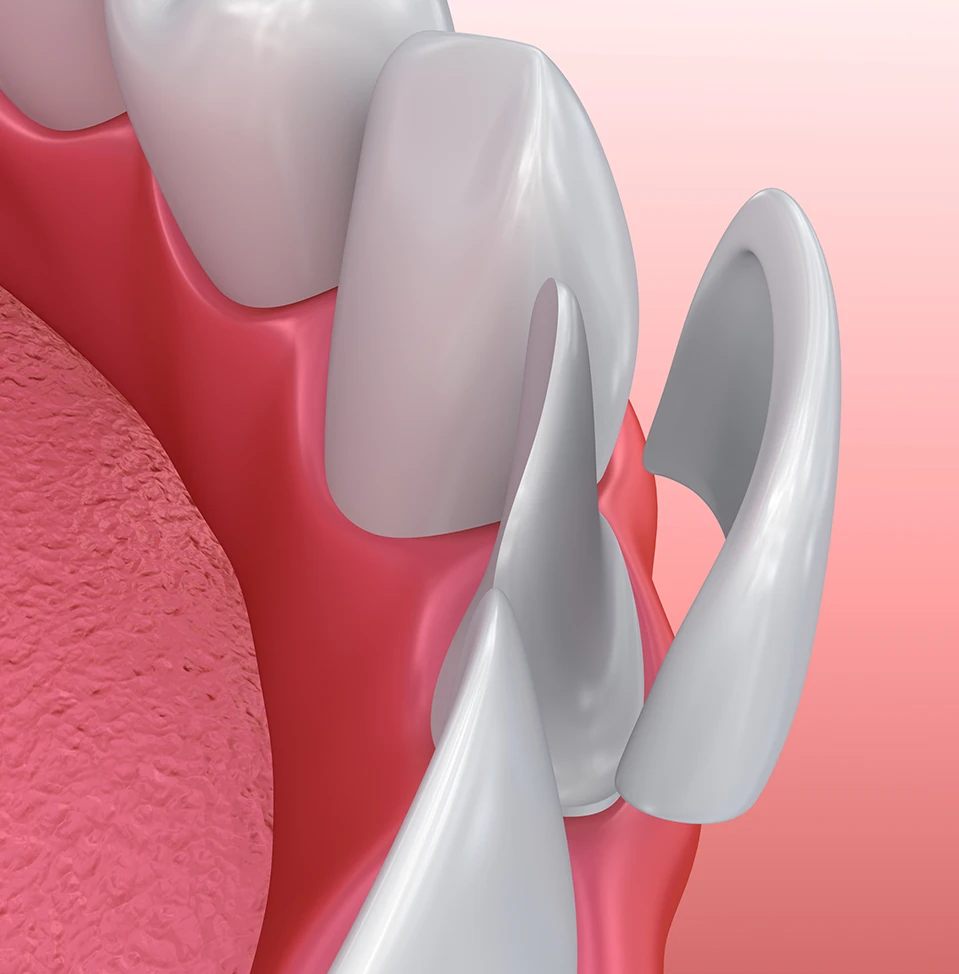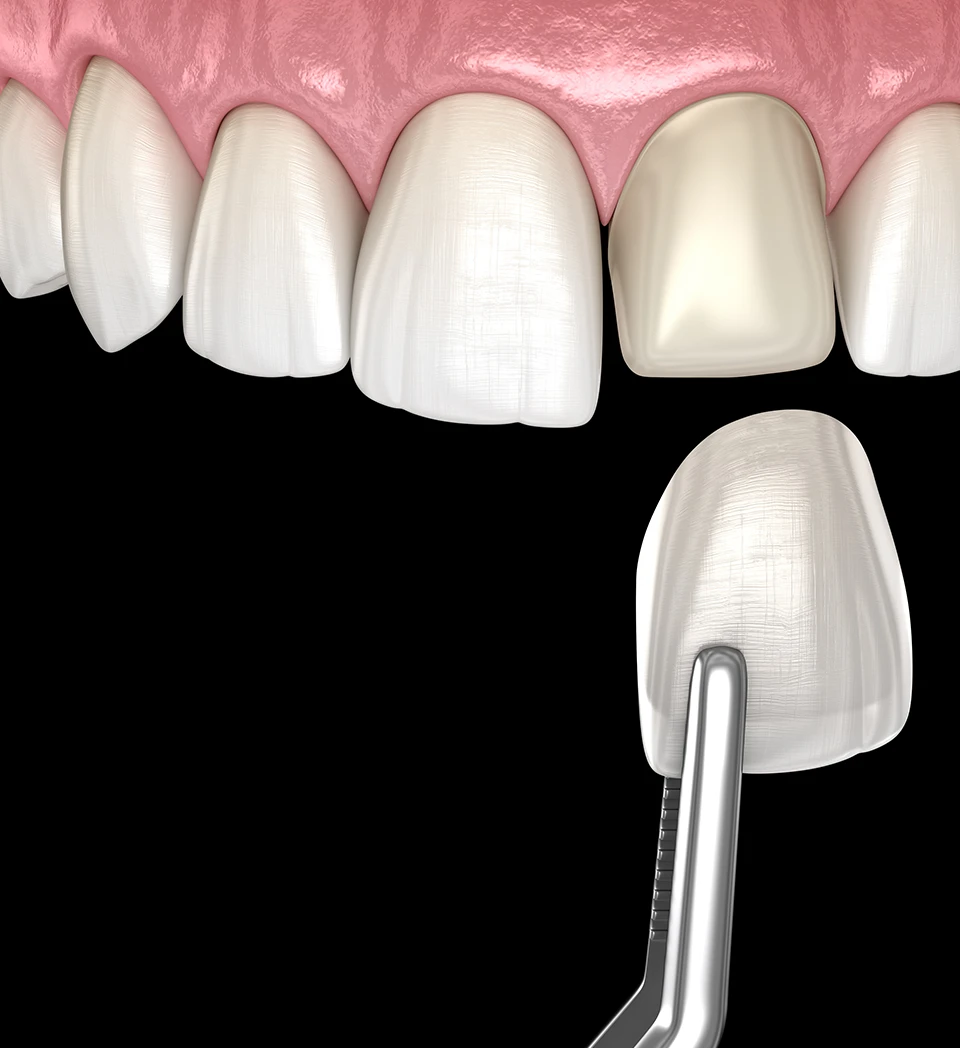Dental Veneers in Ballwin, MO
At Legacy Dental Care in Ballwin, MO, we understand the power of a confident smile. That’s why we provide high-quality cosmetic dentistry procedures, such as dental veneers, to help you get the smile of your dreams. Our expert dentists are committed to delivering individualized treatment and achieving exceptional results. If you’re considering dental veneers to enhance your smile, you’ve come to the right place.

What are Dental Veneers?
Veneers are custom-made coverings designed to fit snugly over the front surfaces of your teeth. Skilled technicians utilize premium dental materials, such as tooth-colored composite or porcelain, to craft these veneers.
Primarily cosmetic in purpose, dental veneers are adept at concealing various aesthetic imperfections. Whether it’s chips, cracks, gaps, tooth discoloration, or other flaws, veneers offer a versatile solution to enhance the appearance of your smile.

Types of Dental Veneers
There are several types of veneers available, each offering unique benefits and considerations:
Composite Veneers
Composite veneers are adept at concealing mild cosmetic issues. Using a tooth-colored composite resin—similar to that used in dental bonding—your dentist can achieve the desired aesthetic results.
Porcelain Veneers
Porcelain veneers are highly versatile and capable of addressing various aesthetic imperfections. These custom-made restorations are crafted to fit your dental anatomy precisely. Before placement, the dentist will remove a little piece of enamel from your natural teeth to help bind and create a solid fit.
No-Prep Veneers
No-prep or minimal-prep veneers offer a less invasive alternative. Similar to traditional porcelain veneers, they are custom-made to suit your smile. However, they necessitate minimal enamel removal compared to their traditional counterparts. It’s important to note that some enamel removal is still required with no-prep veneers.
While no-prep veneers are a viable option for many, they may not be suitable for everyone. Consult with your dentist to determine if you are a candidate for this treatment.
Removable Veneers
Removable veneers, also known as pop-on or snap-on veneers, provide a temporary solution to hide imperfections. Similar to retainers, they can be easily removed as needed. While removable veneers can enhance the appearance of your smile, they may pose challenges when eating and could potentially affect speech.
Limited research exists on removable veneers due to their relatively recent introduction. Before considering this option, consult with your dentist to ensure its safety and suitability for your specific needs.
Benefits of Dental Veneers
Veneers offer a multitude of benefits for patients seeking a more confident smile:

Improved Aesthetics
Veneers address a wide range of cosmetic concerns, including:
1. Discolored teeth due to aging, fluorosis, or medication use
2. Chipped, cracked, or broken teeth
3. Unevenly spaced or misaligned teeth
4. Gaps between teeth
5. Worn-down teeth

Enhanced Confidence
A brighter, more consistent grin can increase your confidence and self-esteem, allowing you to smile freely in social and professional situations.

Durable Results
Porcelain veneers are incredibly strong and can last for 10-15 years or even longer with proper care.

Natural Appearance
Veneers provide a smooth and natural-looking appearance because they are created to precisely match your natural teeth.

Stain Resistance
Coffee, alcohol, and other foods and beverages that might discolor natural teeth can't penetrate porcelain veneers very deeply.

Am I a Candidate for Dental Veneers?
Individuals seeking to improve their smile aesthetics have the option to consider veneers. These dental enhancements effectively conceal various imperfections, including:
- Chipped or fractured teeth.
- Gaps or spaces between teeth are known as diastema.
- Stubborn stains are resistant to traditional teeth whitening methods.
- Teeth are perceived as too small.
- Teeth with irregular shapes.
However, it’s crucial to emphasize that veneers are suitable only for individuals with healthy teeth and gums. If you’re experiencing significant oral health issues such as extensive cavities or gum disease, it’s imperative to address these concerns before pursuing any cosmetic dental procedures.
What to Expect During a Dental Veneers Procedure?
Receiving dental veneers typically involves three visits to your dentist’s office – one for initial consultation and two for the creation and placement of the veneers. Whether you’re considering veneers for a single tooth or multiple teeth, the process remains consistent.
Diagnosis and Treatment Planning
During your first visit, you’ll discuss your desired outcome with your dentist. They’ll examine your teeth to determine if dental veneers are suitable for you, explaining the procedure and its potential outcomes. X-rays may be taken, and impressions of your mouth and teeth might be made to aid in treatment planning.
Preparation
Preparing a tooth for a veneer involves reshaping its surface. Your dentist will remove a portion of the enamel approximately equal to the thickness of the veneer to be added. Together, you’ll decide whether numbing the area is necessary before the enamel is trimmed. Subsequently, a model or impression of your tooth is created, which is sent to a dental laboratory for veneer fabrication. Typically, it takes 2-4 weeks for the veneers to be crafted, during which temporary veneers may be used.
Bonding
Once your custom veneer is ready, your dentist will place it on your tooth to ensure proper fit and color match. Several adjustments may be made before the veneer is cemented in place. Prior to bonding, your tooth will be cleaned, polished, and etched to facilitate strong adhesion. Special cement is applied to the veneer, which is then positioned on your tooth. The veneer’s color can be fine-tuned using the cement shade.
A special light beam is used to activate the cement’s hardening process rapidly. Excess cement is removed, your bite is checked, and final adjustments are made. A follow-up visit may be scheduled in a couple of weeks to assess your gums and ensure the veneer’s optimal placement.

How Much Do Dental Veneers Cost?
Veneers typically aren’t covered by insurance since they’re regarded as a cosmetic procedure. On average, you can anticipate a cost ranging between $925 and $2,500 per tooth, as reported by the American Dental Association.
For composite veneers, the price falls within the range of $400 to $2,000 per tooth, with a lifespan of approximately 5 to 7 years. Generally, traditional veneers prove to be the more cost-effective choice over the long run.
The total expense of your veneers hinges on several factors, including the type of veneers you opt for, the specific brand your dentist offers, the cost of living in your area, and the level of expertise of your dentist. Choosing a clinic with dental students under the supervision of faculty dentists at a dental school can significantly reduce the cost.

Dental Veneers Aftercare Tips
Ensuring the longevity and pristine condition of your veneers requires diligent aftercare. Here are some essential tips to maintain the health and appearance of your new veneers:
Prioritize Oral Hygiene
Maintain a strict oral hygiene routine by brushing your teeth twice daily with a non-abrasive fluoride toothpaste. Additionally, make flossing a daily habit to remove plaque and debris from between your teeth and around the veneers.
Avoid Excessive Force
Refrain from biting down forcefully or chewing on hard foods that could potentially chip or damage your veneers. Opt for softer food options to protect your investment.
Watch Your Beverage Choices
Minimize consumption of beverages known to stain teeth, such as coffee, tea, and red wine. If you do indulge, rinse your mouth with water afterward to minimize staining.
Protect Your Smile During Activities
If you participate in sports or grind your teeth at night, consider using a mouthguard to safeguard your veneers from potential damage.
Regular Dental Checkups
Schedule frequent dental appointments for expert cleanings and an examination of your veneers. Your dentist can identify any problems early on and offer the required care to maintain your smile in good shape.
Avoid Harmful Habits
Steer clear of habits like nail-biting or using your teeth to open packages, as these actions can weaken or damage your veneers over time.
Choose Alcohol-Free Mouthwash
Opt for alcohol-free mouthwash to preserve the bonding material of your veneers and maintain their durability.
Report Issues Promptly
If you notice any chips, cracks, or discomfort with your veneers, don’t hesitate to contact your dentist immediately. Addressing issues promptly can prevent further damage and ensure the longevity of your veneers.
Schedule Your Consultation for Dental Veneers Today!
Ready to experience the life-changing benefits of dental veneers? Contact Legacy Dental Care today to schedule your consultation. Our skilled team is here to answer your questions, address your concerns, and help you achieve the smile you’ve always wanted. Transform your smile and boost your confidence with dental veneers at Legacy Dental Care.

FAQs
Are veneers permanent?
While most dental veneers are a permanent solution, meaning they can’t be easily removed, there are reversible options like minimal-prep or no-prep veneers. With good care, veneers typically last 10 to 15 years.
Can you whiten veneers?
While teeth whitening doesn’t affect veneers, you can still achieve a bright smile! Regular dental cleanings remove surface stains from your natural teeth, keeping them sparkling alongside your veneers.
Should I choose composite bonding or porcelain veneers?
Consult with your dentist to discuss which cosmetic dentistry option is best for your needs.
- Cosmetic bonding is a good choice for minor repairs or cosmetic changes to teeth that are healthy and functioning well.
- Porcelain veneers may be a better option for teeth with more extensive damage, such as chips, cracks, gaps, or severe discoloration. Veneers are also a good choice if you clench or grind your teeth, as they are more durable than bonding.








